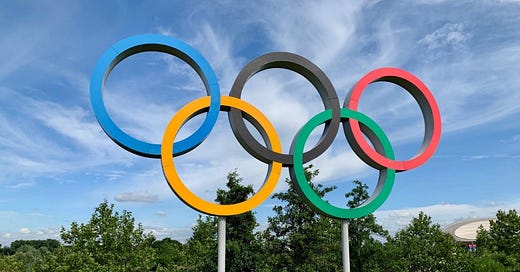Simone Biles’ mental health struggles represent disability rights issues
American gymnast Simone Biles has been the center of attention since removing herself from multiple competitions last week.
Biles said on social media Friday that she is dealing with what is defined as “the twisties”: the sudden inability to feel comfortable while twisting in midair. The 24-year-old six-time Olympic medalist has taken herself out of other events since, saying the decision to break revolved around her mental health. And after prevailing with a bronze medal on the balance beam at the 2021 Olympics on Tuesday, the USA gymnastics star revealed she not only battled through the strain on her mental health and a case of the “twisties,” but the recent death of her aunt.
“Things were not connecting and I don’t know what went wrong,” she said on Tuesday. “People say it’s like stress related, but I honestly, I could not tell you because I felt fine. I think I’m still trying to process this a little bit.”
Biles has ADHD, and some have attributed the issue to Japan’s ban on medications typically used to treat the disorder. But according to a document released by Team USA, “a special arrangement is in place specifically for the Tokyo 2020 Olympic and Paralympic Games to allow athletes taking these medicines for therapeutic use, and with an approved Therapeutic Use Exemption, to import personal supplies for the treatment of their medical condition while they are in Japan.”
At this point, whether Biles brought her medicine feels like a secondary question. To me, the entire situation feels like a microcosm of the disability experience and broader disability rights movement, and frankly, I am disgusted by the reaction.
In simple terms, “the twisties” represent a disconnect between the mind and body — similar to what I and others with disabilities experience on a daily basis. Nondisabled people often forget that the connection between mind and body dictates our lives, and it becomes easy to only see situations through their nondisabled perspective, where the mind-body connection is strong.
But when our minds and bodies are on different pages, there’s nothing quick that we can do to get ourselves on track. Sometimes, for example, my muscles feel like 1,000 pounds and simple movements are impossible. There are times I really want to write, but my body just won’t behave properly, it becomes extremely uncomfortable and even nearly impossible to type and it’s difficult to think about what I would write, quite literally leaving me at a standstill. It has nothing to do with my work ethic.
So to suggest that Biles has lost the work ethic that got her here is totally ignorant. She’s been working her whole life for these moments. She would compete if she could. There’s a difference between being unable to do something and being unwilling to do something, between having nothing to give spiritually or emotionally and having nothing to give because of fatigue or fear. It’s vitally important to recognize this, especially with mental health issues and other invisible disabilities. If I was feeling uncomfortable in my skin hours before I was scheduled to throw my body in the air, I’d also rethink participating.
Disabilities and the mental health crisis still seems to be a touchy subject, with some even denying its existence. And Biles is just the latest episode of the same show, where people look to blame mental health issues on personal problems or a lack of emotional strength. We aren’t supposed to talk about our worst moments, and for celebrities like Biles, that pressure lingers when the spotlight is brightest.
It’s the latest version of “Shut Up and Dribble,” dubbed by Fox News host Laura Ingraham in response to NBA stars like LeBron James shedding light on social issues. The lingering expectations that athletes be superhuman and numb to internal and external forces haunt Biles and others. Some people really don’t want to hear about her struggles, or want to view her as perfect, but that’s on them. She has a disability and there’s nothing wrong with that. Professional athletes are human beings with human problems — even with disabilities.
And somehow suggesting that Biles having a lapse was an attempt to grasp attention would be not only unreasonable, considering she was one of the American stars heading to Tokyo, but also disrespectful — disrespectful to the entire disability community. But it represents a way to argue that Biles does not have a disability and to attribute the situation to an action of hers — to argue that this is her fault and must diminish her legacy.
I’m not here to suggest Biles has a disability other than ADHD, but instead in hopes of communicating the seriousness of the situation — her struggles and the insensitive reaction that followed. Having a disability means that one’s body is not on the same page with itself, and I think it’s impossible to remove the ADHD and overall disability perspective from the equation.
Originally published at http://www.wheelchairqb.com on August 3, 2021.



